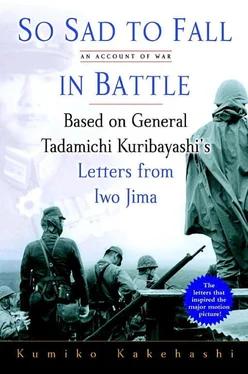The conflict was already turning into a total war, with no distinction between the military and civilian noncombatants. The Japanese citizenry was expected, as the “people of a nation at war” to sacrifice everything for the successful prosecution of the war. But Kuribayashi had a firm belief that soldiers like himself existed in order to make sure that ordinary citizens could get on with life as normal.
In Tôkon Iô-Tô there is an anecdote related by Sakurai Naosaku, a civilian resident of the island who was the director of the Iô-Jima Sangyô Company . In the first few days after Kuribayashi arrived and before a proper headquarters had been set up, he rented a room in Sakurai’s house to use as his temporary command center.
I often had meals together with Kuribayashi on the veranda, and admired and respected him for the way he took the lead on saving water. One of the chiefs of staff, who had a mustache, and Fujita, the adjutant, dined with us.
When the news of the fall of Saipan was broadcast early in July, I asked him: “So, Your Honor, will you soon be luring the enemy here to Iwo Jima to give them a good thrashing?” Kuribayashi, who was always cheerful, replied: “We just haven’t the strength for that. I’m afraid we’re going to cause you all a great deal of trouble, but with things the way they are, there’s just nothing we can do.” I was really surprised at his response.
Presumably, Sakurai had expected to hear—as anyone would from a normal general—confident assertions about sending the enemy packing with their tails between their legs, but Kuribayashi was just not like that.
Small though Iwo Jima might be, for the residents it was their beloved home. As soon as the fighting started, their houses and their workplaces would be smashed to smithereens. This was Kuribayashi’s apology to the inhabitants of the island for being powerless to protect them, even though protecting civilians was what the military’s job was all about.
—
WHAT WERE KURIBAYASHI’S thoughts about the coming battle at this stage? The remarks by Musashino Kikuzô below are from Tôkon Iô-Tô. As captain of the engineering battalion, Musashino lived in the same quarters as Kuribayashi for some time after he had arrived on the island.
When he wasn’t performing his public duties, he would chat and laugh just like any other fellow officer. He really was a gentle, rather bookish sort of general. He once said to me: “I was in America for about five years, and their peacetime industries are very advanced. They’re organized so that if a war broke out they could switch over to producing munitions within a few hours of getting a telegram. The Japanese war planners never even bothered to think about an important issue like that. No matter how many times I repeated myself, they just didn’t get it. However biased a view you have, our chance of winning this war is zero. But we have to fight as long as we have the strength left to do so; we have to fight down to the last drop of blood.”
I have quoted extensively from the 1965 book Tôkon Iô-Tô. My copy was actually lent to me by Kuribayashi Naotaka, the present head of the Kuribayashi family, when I went to visit the house where Kuribayashi Tadamichi was born in Matsuhirochô, Nagano. The book had belonged to Naotaka’s father, Sunao. (Sunao, who died in 1998, was the eldest son of Kuribayashi Tadamichi’s elder brother, Yoshima.)
In the book, somebody had underlined in red the comment reported by Musashino, the captain of the engineer battalion (“I was in America for about five years, and…”), and there was a handwritten note in the margin that said: “Uncle Tadamichi often used to say this.”
As a soldier, Kuribayashi knew a great deal about the United States. During his first sojourn there, from 1928 to 1930, while still a captain in his late thirties, he conducted military research; then, from 1931 to 1933, he lived in Canada as military attaché.
While studying in America, Kuribayashi lived in major cities like Washington, D.C., and Boston, as well as Fort Bliss, the Texas base of the U.S. cavalry regiment, and Fort Riley, Kansas, home to an infantry division. He visited New York, San Francisco, and Los Angeles, and even drove himself across the whole continent. The sense he had of the military and industrial might of the United States was based on his own firsthand observations.
There is no evidence that the Japanese army leadership took advantage of Kuribayashi’s knowledge and experience. Quite the opposite, in fact. There is even a theory that he was seen as pro-American and given the cold shoulder as a result. The conventional view may be that Kuribayashi was assigned to Iwo Jima because he was regarded as an able commander, but there is another interpretation in which his American-style rational thinking made him unpopular, and a deliberate choice was made to send him to a battle from which he was sure not to return alive.
Nishi Takeichi Danshaku, winner of an equestrian gold medal in the 1932 Los Angeles Olympics, was another prominent military man who met his end on Iwo Jima. A first lieutenant in the cavalry when he took part in the Olympics, he was a lieutenant colonel by the time of his assignment to Iwo Jima. Thanks to his performance at the Olympics, Baron Nishi (“baron” is the English equivalent of the Japanese title danshaku ) had become something of a celebrity in American high society and had many friends in the United States. At the time, the rumor circulated that he, too, had been packed off to a battle zone where annihilation was a certainty because he was perceived to be pro-American.
Putting to one side the question of whether or not Kuribayashi was “pro-American,” one thing is crystal clear. Despite knowing very well that the whole war was reckless and ill-advised, he was still determined to do his utmost to defend the island for as long as he could.
IT WAS ON JULY 7, 1944, exactly a month after Kuribayashi had arrived on Iwo Jima to take up his post, and, by happenstance, Kuribayashi’s fifty-third birthday, that Saipan fell after sending out a “farewell telegram” that read: “We will meet an honorable death serving as a bulwark of the Pacific.” But even at this early stage, Kuribayashi had already formed a firm idea of how to prepare for the American attack and how to fight them once they landed.
After much deliberation, he selected a method that was completely contrary to the traditions of the Japanese army. And it was because of Kuribayashi’s choice of method—a choice that was derided as rash and that aroused universal opposition at the time—that the name Iwo Jima ended up being etched so deeply into the histories of both Japan and the United States.
CHAPTER THREE
THE STRATEGY
—
SEVEN YEARS AFTER THE DEFEAT AT IWO JIMA, IN 1952, Andô Tomiji, an employee in the Iwo Jima field office of the Takano Kensetsu construction company, made a stunning discovery. Deep within a cave in the interior of the island, among the scattered bones and personal effects of its defenders, he found an army notebook. In it was written the following list.
1. We shall defend this place with all our strength to the end.
2. We shall fling ourselves against the enemy tanks clutching explosives to destroy them.
3. We shall slaughter the enemy, dashing in among them to kill them.
4. Every one of our shots shall be on target and kill the enemy.
5. We shall not die until we have killed ten of the enemy.
6. We shall continue to harass the enemy with guerrilla tactics even if only one of us remains alive.
These six fervent statements constitute the “Courageous Battle Vows” that Kuribayashi composed and distributed to all his men. The vows are basically a collection of slogans outlining a soldier’s proper state of mind in which to face battle.
Читать дальше












